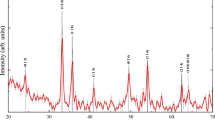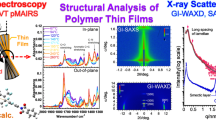Abstract
A VARIETY of polymers have been subjected to irradiation in the Harwell pile, and electrons from a Van de Graaff generator, the results being followed mainly by X-ray diffraction. The initial effect is to break down bonds, some ionic, the majority covalent. The radicals formed can react in a number of ways. In the presence of oxygen they can form low-molecular weight compounds and carboxyl end-groups; different end-groups and low-molecular weight compounds can be formed in the absence of oxygen; they can reform the original bonds; or they can recombine in other ways.
This is a preview of subscription content, access via your institution
Access options
Subscribe to this journal
Receive 51 print issues and online access
$199.00 per year
only $3.90 per issue
Buy this article
- Purchase on Springer Link
- Instant access to full article PDF
Prices may be subject to local taxes which are calculated during checkout
Similar content being viewed by others
References
Hill, R., and Walker, E. E., J. Polymer Sci., 3, 609 (1948).
Sisman, O., and Bopp, C. D., ORNL 928 (1951).
Author information
Authors and Affiliations
Rights and permissions
About this article
Cite this article
LITTLE, K. Irradiation of Linear High Polymers. Nature 170, 1075–1076 (1952). https://doi.org/10.1038/1701075a0
Issue Date:
DOI: https://doi.org/10.1038/1701075a0
This article is cited by
-
Effect of ? radiation on the long-term strength of polyethylene terephthalate
Polymer Mechanics (1975)
-
Some Effects of Irradiation on Nylon and Polyethylene Terephthalate
Nature (1954)
-
Irradiation of Polymers by High-Energy Electrons
Nature (1953)
Comments
By submitting a comment you agree to abide by our Terms and Community Guidelines. If you find something abusive or that does not comply with our terms or guidelines please flag it as inappropriate.



